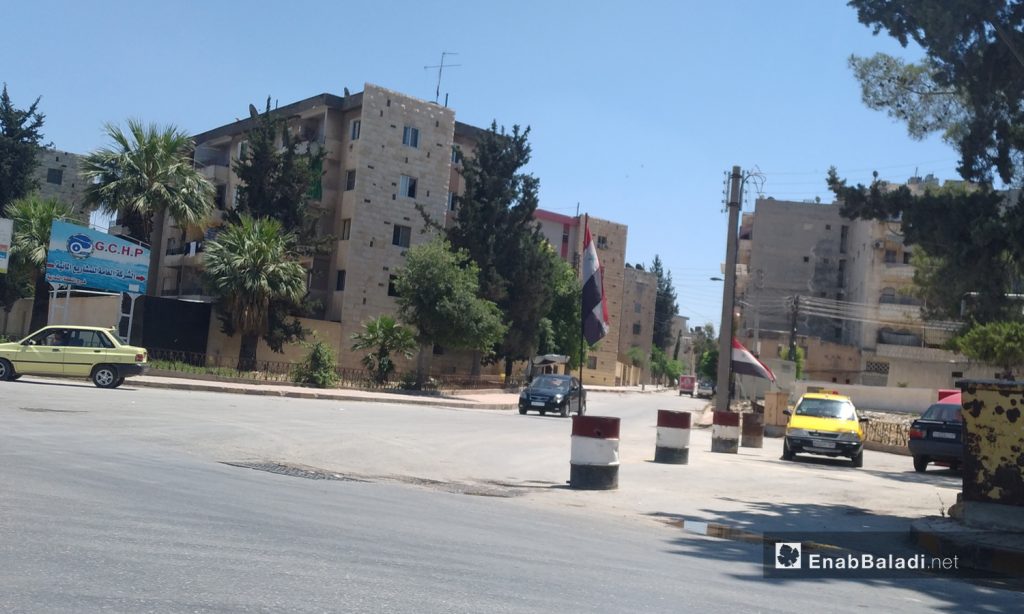Aleppo – Saber al-Halabi
The selling of houses and shops has increased in Aleppo city, following statements by Brigadier General Elias Bitar, the head of the Exemptions and Reserves Branch in the Syrian regime’s army, about the possibility of seizing the monetary assets and property of military service evaders or their relatives for not paying the exemption fees after reaching the age of 42.
Less than ten days after the release of Bitar’s video recording, on 6 February, talking about seizing the funds and property of citizens over 42 years who did not enroll themselves in the military service or pay the exemption fee, the Syrian Ministry of Foreign Affairs and Expatriates denied the decision. Still, residents of areas controlled by the Syrian regime remained unassured from the statements.
Families inside and outside Aleppo city offered their houses and properties for sale in February, fearing that they would be seized because a relative of them living abroad evaded mandatory service and failed to pay the exemption fee.
Preventive move
Asma put up her brother’s house in the Mocambo neighborhood, a high-end neighborhood west of Aleppo, for sale for 500 million Syrian pounds (about 143,000 USD). She did not trust the official negation and told Enab Baladi, “the talk about the seizure of military service drafters’ properties is beyond rumors. It is an upcoming decision published now to test people’s reaction.”
Asma agreed with her brother, who is living in Denmark, on selling his house to avoid being confiscated for evading military service. Asma’s cousins in Germany did the exact thing and sold their properties for the same reason. “I hope to be able to sell the house through a power of attorney and then transfer the amount for which the house was sold in separate transfers to my brother.”
For his part, Noureddin, a resident of Aleppo city, told Enab Baladi that he had asked his father to offer his house and car for sale driven by his fear of the seizure decision’s implementation against the assets of military service evaders and their families and close relatives.
He said, “If applied, this decision would cause hundreds of thousands of families to be displaced, including my family, so I agreed with my father on selling my properties and keeping the money to avoid them being seized, especially that some of my relatives did not perform the compulsory military service which puts our properties in danger of confiscation.”
Seizure of assets: forthcoming decision or empty threats?
A state of confusion and anger prevailed among a large segment of Syrian civilians following Bitar’s statements. This caused Syria’s Ministry of Foreign Affairs and Expatriates, represented by the Director of the Consular Department, Hassan Khaddour, to deny the validity of the potential seizure of military service evaders’ assets in an interview broadcasted on the state-run al-Ikhbaria Syria TV channel on 15 February.
“The seizure decision of military service evaders or their relatives’ assets is still under study,” a lieutenant in the State Security Branch told Enab Baladi on the condition of anonymity for security reasons.
He added, discussions on the decision will be postponed until after the end of the presidential elections, which will take place between April and May 2021, to cut off any chance of controversy. “The decision will most likely come into force after the end of the presidential elections, and the seized houses, shops, and cars will be sold out in the public auction.”
An element of the State Security Branch’s communication department confirmed that the talk about the confiscation of the movable and immovable assets of military evaders or their close relatives was to test people’s reactions inside and outside of Syria.
“The confirmation or negation of the decision does not change the fact that the decision will be applied in May. Lists for the houses that will be seized have been prepared since mid – 2020,” the element told Enab Baladi after requesting that his name be withheld for security concerns.
Registering real estate contracts on old dates to avoid seizure
All real estate transactions, including selling and buying contracts, are registered in the Secretariat of the Sabaa Bahrat land registry in old Aleppo, where the First Enforcement Court and the Magistrate Court are located.
While it is required that the registration dates of the contracts should match the dates of their signing, citizens are registering them on old dates to avoid seizure and restrictive decisions on selling.
An employee in the land registry told Enab Baladi on the condition of anonymity for security reasons that citizens are managing to register their real estate selling transactions on old dates after bribing employees, who would archive the contracts according to the registered dates. “Witnesses can be requested to confirm that the property purchase was concluded on a date prior to the current period, or during the period registered on the contract.”
The land registry employee added that most of the contracts registered during the past four years, since the regime forces controlled Aleppo’s eastern neighborhoods to this day, are often registered on old dates. “This is useful in case the decision to seize the assets of military evaders or their families and relatives was ever applied.”

